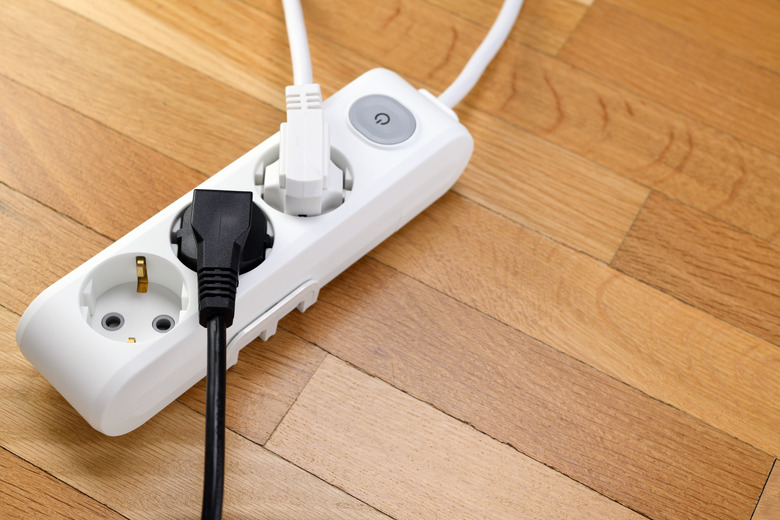How To Use An Extension Cord With A Power Strip
We may receive a commission on purchases made from links.
Using an extension cord and power strip incorrectly can become a fire hazard and can increase your risk of electrical shock. While extension cords can come in handy when you need a short-term power extension, they're not meant for long-term use. You need to follow extension cord and power strip safety protocols to keep yourself and your home safe.
Dangers of Extension Cords
Dangers of Extension Cords
One of the biggest risks of using extension cords and power strips is using one that can't handle the power demand. A larger load than the cord can handle can cause it to overheat and cause damage to the parts, including the wire connections and insulation. It can eventually get hot enough to start a fire. Placing an extension cord in a wall, under a rug, or in other covered or enclosed areas where the heat can't escape increases the fire risk.
Improperly sized extension cords can also damage the tools or appliances you plug into them. The electrical items might overheat, or they might not receive enough power to operate properly. Appliances that are underpowered might experience unnecessary wear or permanent damage.
When To Use Extension Cords
When To Use Extension Cords
All extension cords are designed for temporary use. Use them for low-power items that match the cord's rating, such as temporary work lights, portable fans, or shop vacs. Look for the maximum amperage rating on the cord to determine if it's large enough to power the electrical item. Total the amps of all items you plan to plug into the extension cord or power strip to ensure it can handle the entire load.
Choose the appropriate type of extension cord based on the location. Outdoor extension cords are designed for outdoor conditions and extreme temperatures. Never use an indoor-only extension cord or power strip outdoors, even in mild weather conditions.
When Not To Use Them
When Not To Use Them
Never use an extension cord for long-term use to supply power to an item that you use all the time. For example, don't use an extension cord for a lamp because you want to place it somewhere away from an electrical outlet. This ongoing use can cause your extension cord to deteriorate, which increases the risk of electrical shock or a fire.
Avoid keeping an extension cord plugged into a wall outlet indefinitely. You should only plug it in when needed and use it temporarily. If you need a closer power source for ongoing use, consider having more electrical outlets installed by a licensed electrician.
You should never use extension cords for high-power items. This includes most appliances, such as air conditioners, space heaters, microwaves, and refrigerators. This creates a fire hazard and typically goes against the appliance manufacturer's recommendations. It can also be risky to plug sensitive electronics into an extension cord without any surge protection. It only takes a minor surge to damage electronics in many cases.
Extension Cords With Power Strips
Extension Cords With Power Strips
To safely use an extension cord with a power strip, you need to ensure the power strip can handle the total load that's plugged into it. Power strips typically have multiple outlets, as do extension cords. If you have items plugged into every spot on the power strip plus all of the spots on the extension cord, you can have a power demand that's too much for the power strip.
Check the rating for both the power strip and the extension cord to ensure they're rated for the way you want to use them. Look at everything that's plugged into the power strip, not just the items that are plugged into the extension cord. Make sure the total doesn't exceed the maximum for the power strip.
Monitor the power strip and extension cord for signs of overheating. If any part of either feels hot to the touch, it is likely overloaded and is overheating. Avoid using anything that has exposed wires or visible damage.
